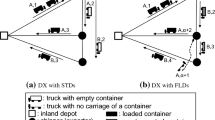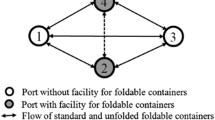Abstract
This article analyses the way in which foldable containers could potentially lower the costs of container fleet management in liner shipping networks. An integer programming model is used to obtain an optimal fleet mix of foldable and standard containers. It emerges that savings could be realised in the management costs of container fleets by applying a proper combination of the two. It also emerges that the economic viability of foldable containers depends on the level of trade imbalances and the exploitation costs of the containers.








Similar content being viewed by others
References
Boile, M. (2005) Empty intermodal container management. Presentation, NJDOT Research Showcase, 14 October.
Cheung, R.K. and Chen, C. (1998) A two-stage stochastic network model and solution methods for the dynamic empty container allocation problem. Transportation Science 32 (2): 142–162.
Choong, S.T., Cole, M.H. and Kutanoglu, E. (2002) Empty container management for intermodal transportation networks. Transportation Research Part E 38 (6): 423–438.
Coslovich, L., Pesenti, R. and Ukovich, W. (2006) Minimizing fleet operating costs for a container transportation company. European Journal of Operational Research 171 (3): 776–786.
Crainic, T.G., Gendreau, M. and Dejax, P. (1993) Dynamic and stochastic models for the allocation of empty containers. Operations Research 41 (1): 102–126.
De Brito, M. and Konings, R. (2007) Container management strategies to deal with the East–West flows imbalance. NECTAR cluster meeting, Delft.
Dong, J.-X. and Song, D.-P. (2009) Container fleet sizing and empty repositioning in liner shipping systems. Transportation Research Part E 45 (6): 860–877.
Drewry Shipping Consultants. (2007) Annual Container Market Review and Forecast – 2007/08. London: Drewry Shipping Consultants.
Erera, A.L., Morales, J.C. and Savelsbergh, M. (2005) Global intermodal tank container management for the chemical industry. Transportation Research Part E 41 (6): 551–566.
Imai, A. and Rivera, F. (2001) Strategic fleet size planning for maritime refrigerated containers. Maritime Policy and Management 28 (4): 361–374.
Imai, A., Shintani, K. and Papadimitriou, S. (2009) Multi-port vs. Hub-and-Spoke port calls by containerships. Transportation Research Part E 45 (5): 470–757.
Imai, A., Nishimura, E., Papadimitriou, S. and Liu, M. (2006) The economic viability of container mega-ships. Transportation Research Part E 42 (1): 21–41.
Jula, H., Chassiakos, A. and Ioannou, P. (2006) Port dynamic empty container reuse. Transportation Research Part E 42 (1): 43–60.
Konings, R. (2005) Foldable containers to reduce the costs of empty transport? A cost-benefit analysis from a chain and multi-actor perspective. Maritime Economics & Logistics 7 (3): 223–249.
Konings, R. and Thijs, R. (2001) Foldable containers: A new strategy to reduce container repositioning costs, technological, logistics and economic issues. European Journal of Transport and Infrastructure Research 1 (4): 333–352.
Li, J.-A., Liu, K.,, Leung, S.C.H. and Lai, K.-K. (2004) Empty container management in a port with long-run average criterion. Mathematical and Computer Modelling 40 (1–2): 85–100.
Lam, S.-W., Lee, L.-H. and Tang, L.-C. (2007) An approximate dynamic programming approach for the empty container allocation problem. Transportation Research Part C 15 (4): 265–277.
MDS Transmodal. (2010a) Tradelane cargo analysis: Supply/demand indicators for container shipping. Containerisation International, May: 4–5.
MDS Transmodal. (2010b) Tradelane cargo analysis: Supply/demand indicators for container shipping. Containerisation International, January: 4–5.
Shintani, K., Konings, R. and Imai, A. (2010) The impact of foldable containers on container fleet management costs in hinterland transport. Transportation Research Part E 46 (5): 750–763.
Shintani, K., Imai, A., Nishimura, E. and Papadimitriou, S. (2007) The container shipping network design problem with empty container repositioning. Transportation Research Part E 43 (1): 39–59.
van Binsbergen, A.J. et al (2000) Literatuursearch opvouwbare laadeenheden. Werkdocument in het kader van het project opvouwbare laadeenheden, 4 mei.
Websites:
Acknowledgements
The authors would like to thank two anonymous referees for their time, support and helpful suggestions that have improved this article to a great extent. This study was co-funded by the Grant-in-Aid for Scientific Research (C) No. 22510149 and No. 24510218 the Japan Society for the Promotion of Science.
Author information
Authors and Affiliations
Rights and permissions
About this article
Cite this article
Shintani, K., Konings, R. & Imai, A. The effect of foldable containers on the costs of container fleet management in liner shipping networks. Marit Econ Logist 14, 455–479 (2012). https://doi.org/10.1057/mel.2012.16
Published:
Issue Date:
DOI: https://doi.org/10.1057/mel.2012.16




